Submitted by WA Contents
Maurice Mentjens renovates historic municipal museum with gold-skinned exterior in the heart of Weert
Netherlands Architecture News - May 03, 2022 - 11:27 3364 views
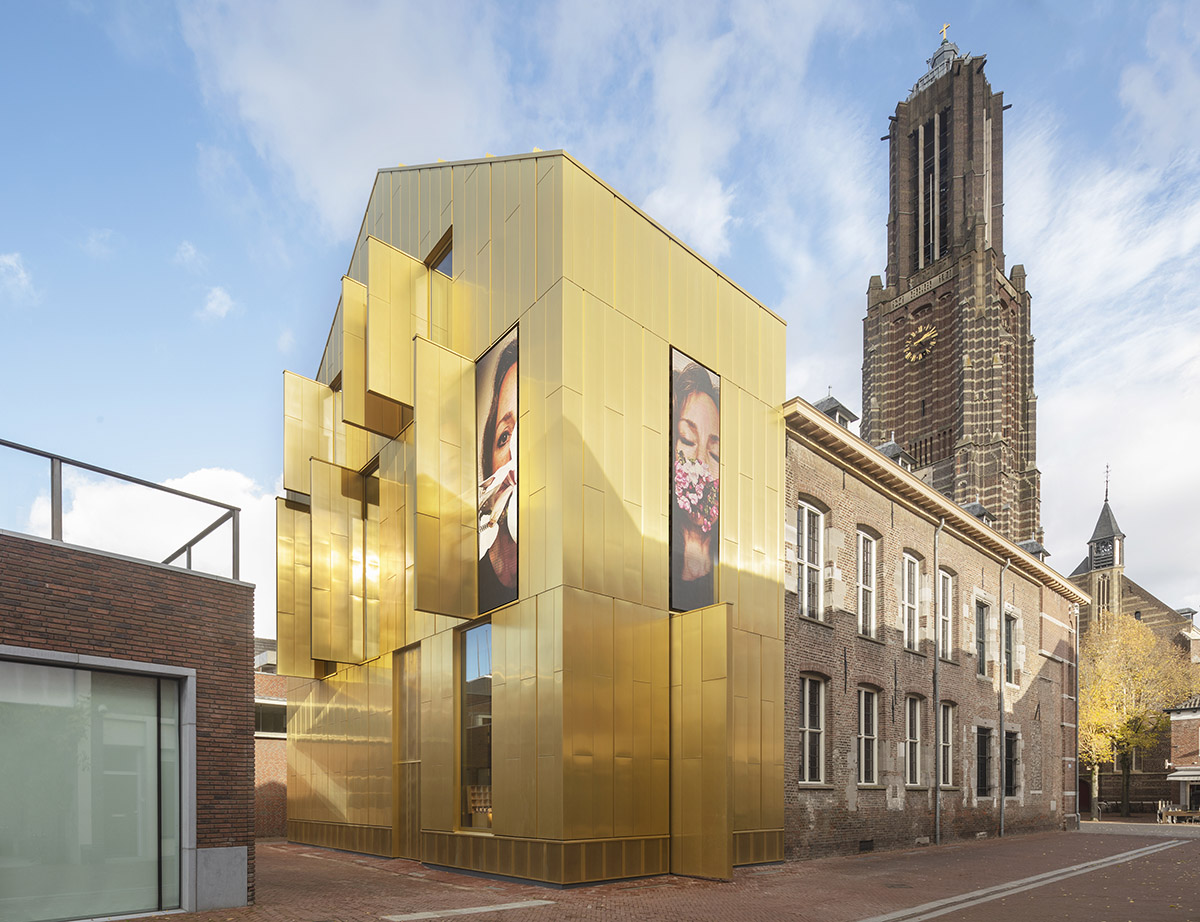
Interior designer Maurice Mentjens has renovated an old municipal museum with an eye-catching matte gold-skinned exterior in the heart of Weert, the Netherlands.
Called Museum W, the museum has been opened with an exhibition, titled Forever Endeavour, designed by Studio Job.
The City Council of Weert commissioned Maurice Mentjens to restore and refurbish its local Municipal Museum (Gemeentemuseum Weert). The museum has been established in Weert’s former city hall since 1982.
The designer blended the past and the present together in a golden-skinned national heritage-listed building. Large golden yellow shutters complement the historic elements of the building, creating like a monumental entrance.
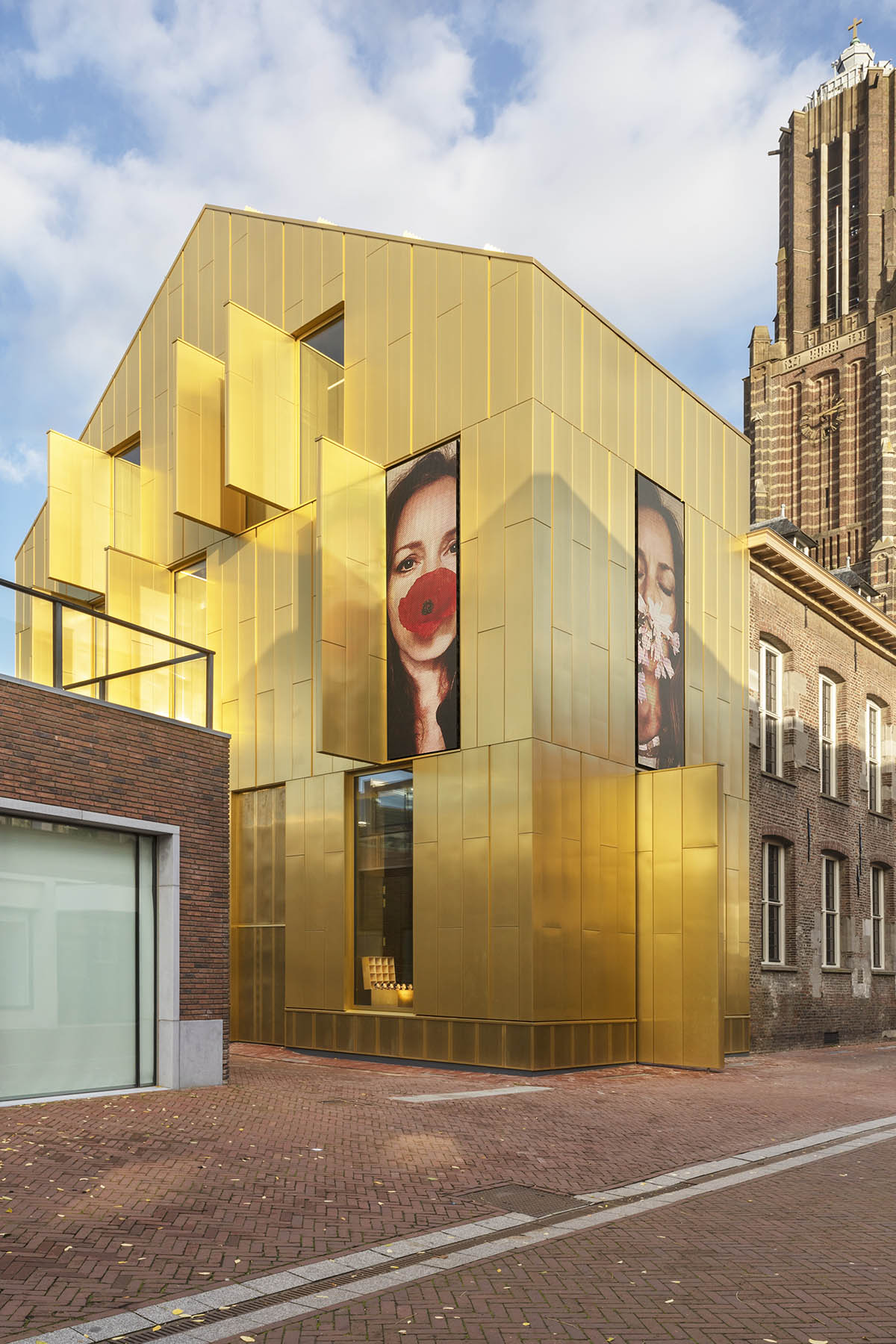
With this renovation, the project enriches the interior of the building with a brand new museum interior, while making visible the monumental historical elements of this important national heritage site in the very center of Weert.
"Museums are the holy places of our present-day secularized society," explained Maurice Mentjens, "and works of art are the relics of every culture."
"These are preserved for posterity in museums. On the basis of this premise, the idea of designing the rear façade of the museum to resemble a gold-cladded reliquary, in which the relics of the holy are kept, was conceived."
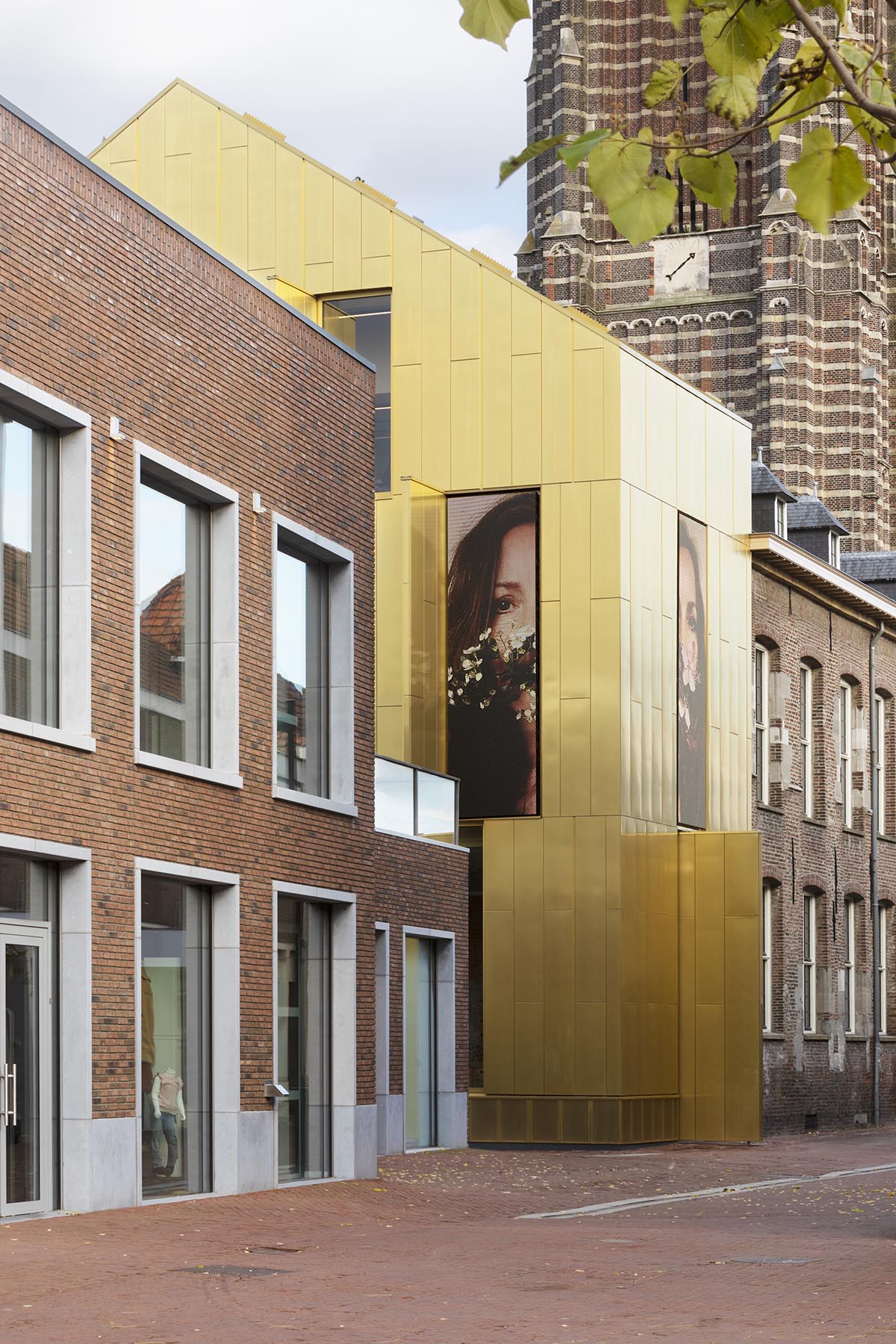
The modern golden façade features two large screens on which video installations created by artists or information about current or future exhibitions are projected.
The large windows serve as showcases for the works of art, which in turn serve as display windows or visual depositories, to give passers-by a glimpse of the museum’s treasures, as if they were relics in a reliquary.
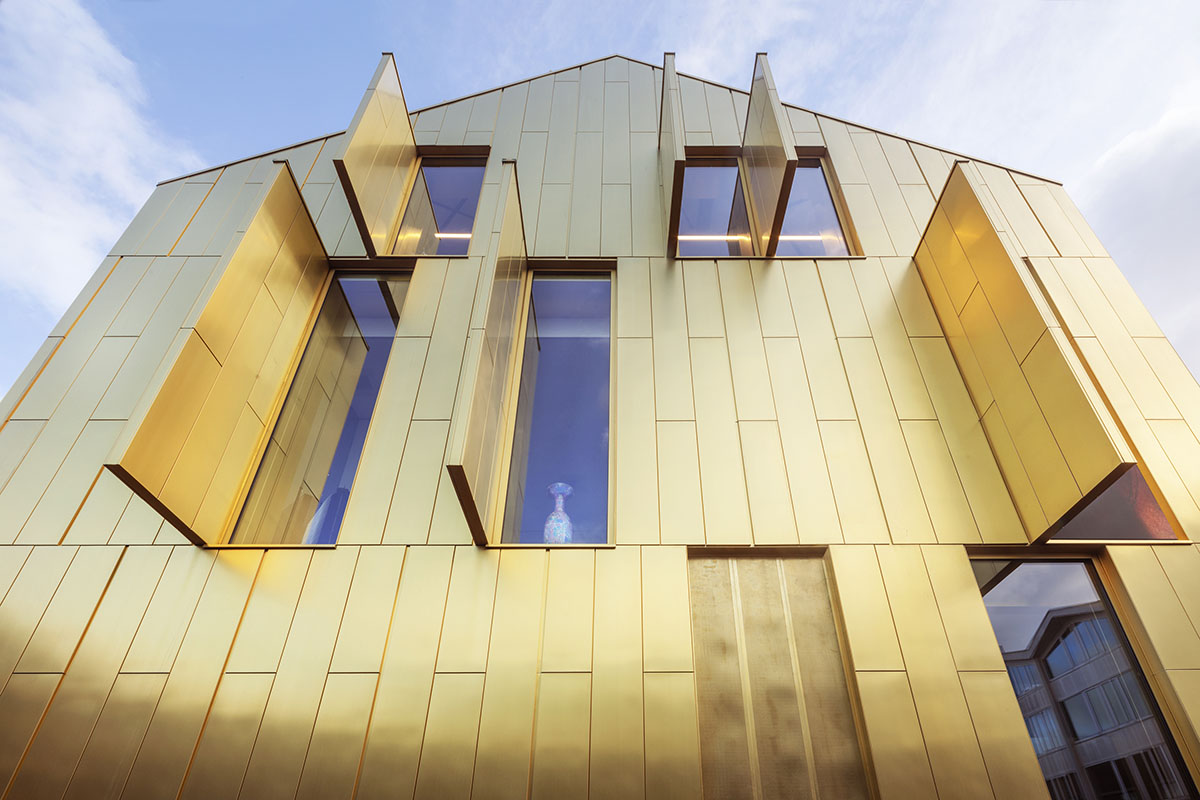
The façade, which is fitted with golden shutters on all stories, refers not only to the historic façade on the Markt side with its characteristic red shutters flanking the cross-windows, but can also be construed as an enormous Advent calendar: behind every shutter a ‘treasure’ – a relic or work of art – is concealed.
Covering a total of 1,134-square-metre area, the three-storey museum creates distinct exhibition spaces for permanent or temporary collections.
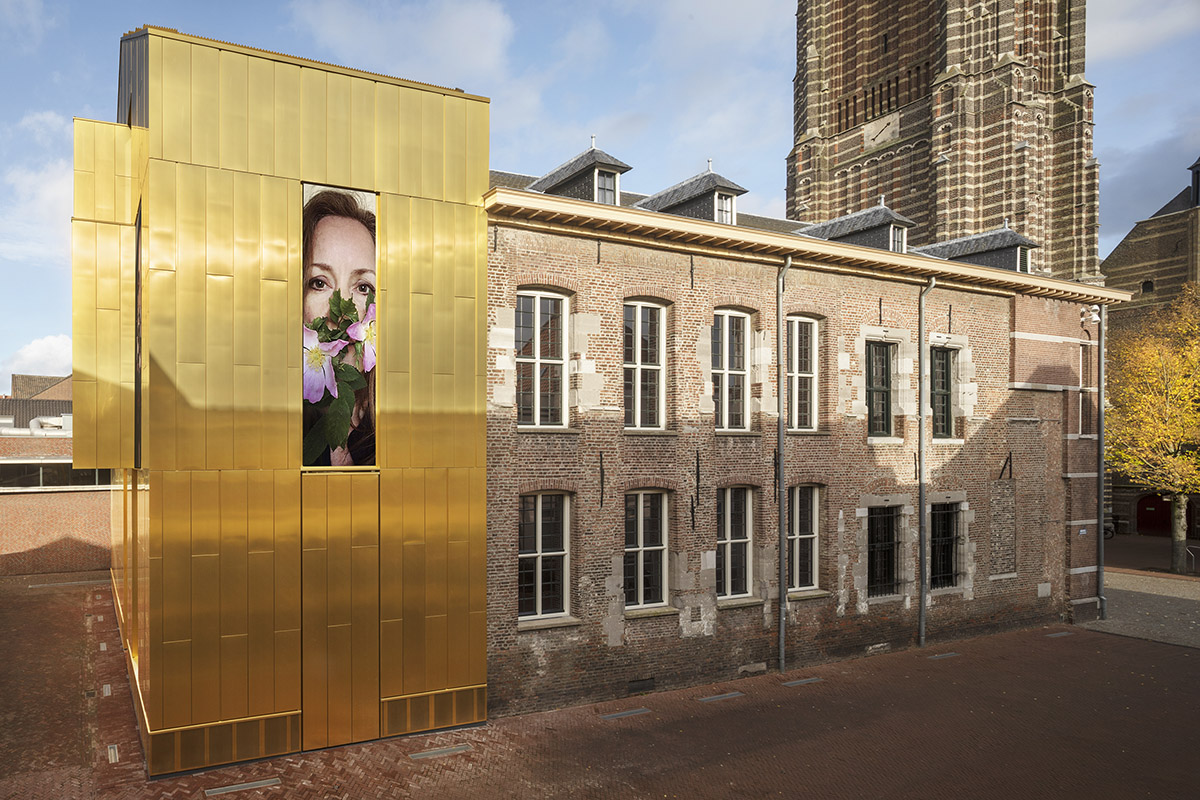
Façade acts as the new protagonist of design
The new façade is implemented in the rear part of the historic building. The designer preserves the oldest elements of this section, as well as the south-facing façade on De Meikoel, date back to the mid-16th century.
Directly opposite Saint Martin’s Church, the second façade at the front, facing the Markt, comprises an additional shell, as it were, that is typified by the large-scale Renaissance Revival-style restoration that was carried out in 1913.
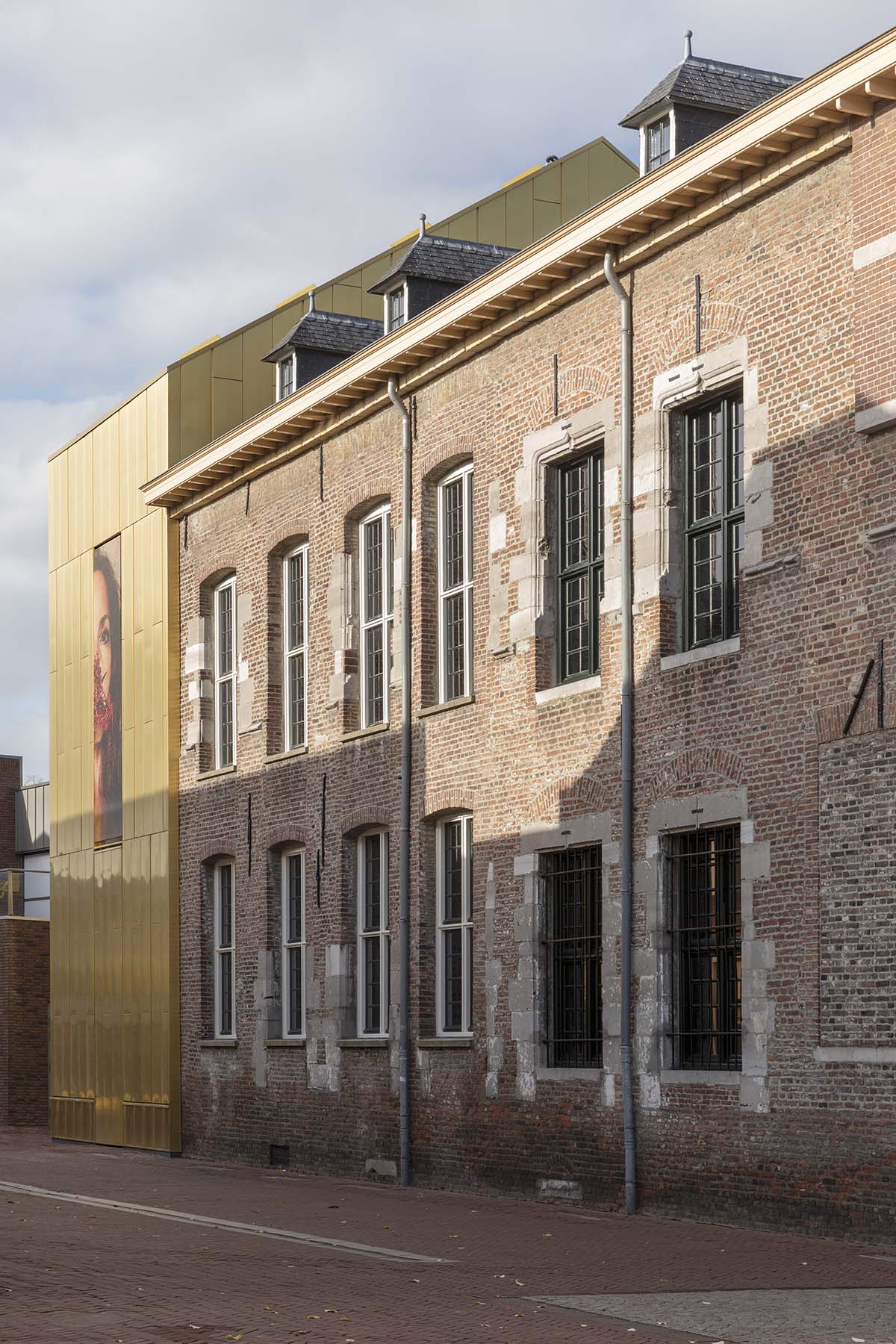
Following the discovery of late-Medieval elements articulating the layout of the façade and window frames on the south-facing façade, the recent renovation of the old west-facing façade in 2021 revealed a natural stone window frame and arches.
The third ‘face’ of the museum, created in 2021, faces the Nieuwe Markt and the Muntpassage shopping mall: a contemporary façade cladded with a shell of Tecu®Gold, a material that is a new alloy of recycled aluminium and copper.
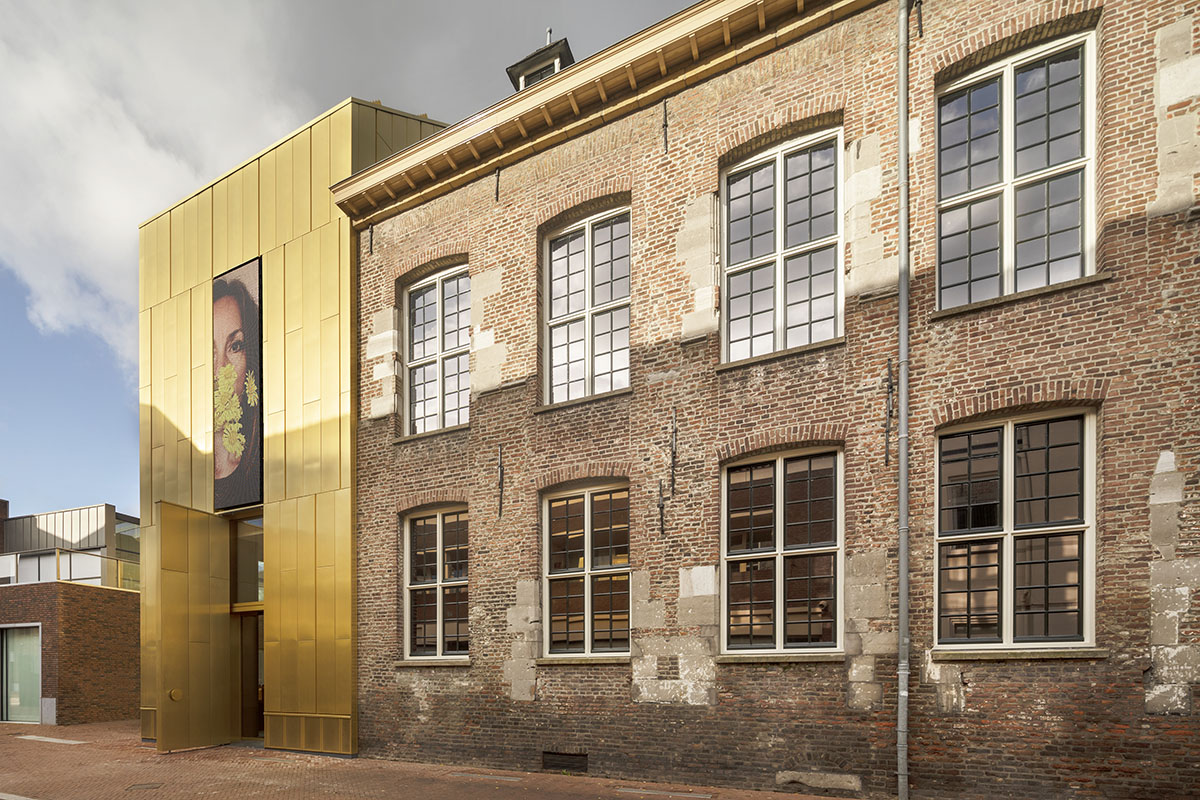
For material choice, Maurice Mentjens carefully chose this material. According to the designer, unlike brass, "this material does not age or turn brown or black." It remains a lovely matte shade of golden yellow, just like our euro coins which are made from the same material.
The cladding on the façade is 1 mm thick. Each sheet has been folded over at the sides, which gives the façade a pronounced sense of rigidity. In addition, a 20 mm-thick hard-pressed insulation panel has been glued behind each Tecu®Gold panel. This increases the rigidity of the structure even more.
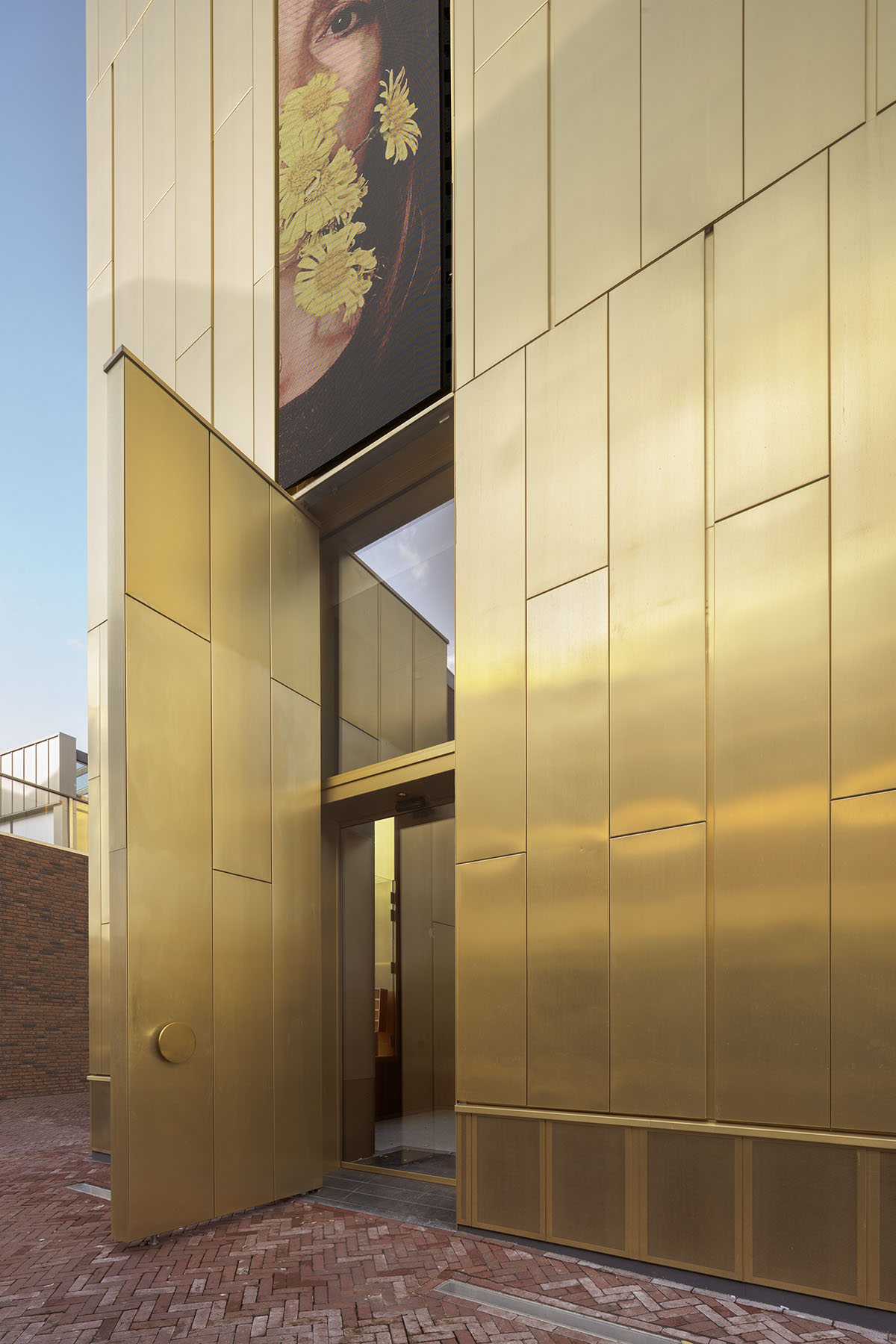
The designer explains why he opted for Tecu®Gold, which has never been used in a project of this scale before in the Netherlands: ‘The material also represents immense cultural wealth and therefore serves as a beautiful reference to the priceless history that is preserved here for future generations.’
While some of the parts are restored to its former glory, such as the wainscoting in the halls and the original oak ceiling in the old Council Hall, some parts were redesigned so that the museum can accommodate for new facilities in a contemporary look.
For example, the walls of the monumental hall have been clad in a new textile covering. The venue is currently used for exhibitions and activities that can be attended by the general public, such as lectures and concerts.
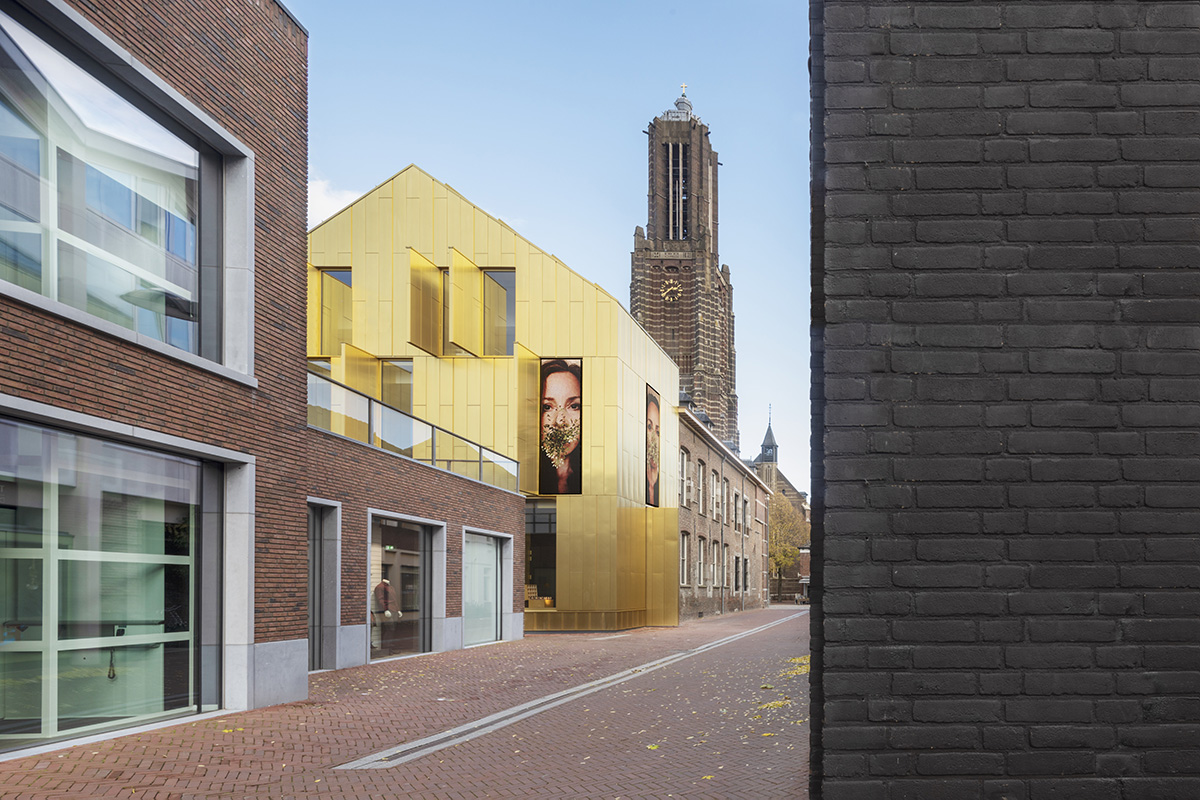
The museum includes new easily accessible entrance
The designer consciously relocated the entrance on the south-facing façade so that the museum would have an easily recognizable entrance on the ground floor for problem-free access by wheelchair users.
"This new arrangement also makes it possible to use all the distinct exhibition spaces on the ground floor as a single continuous exhibition, without any differences in elevation, to facilitate large-scale temporary exhibitions," stated the press release.
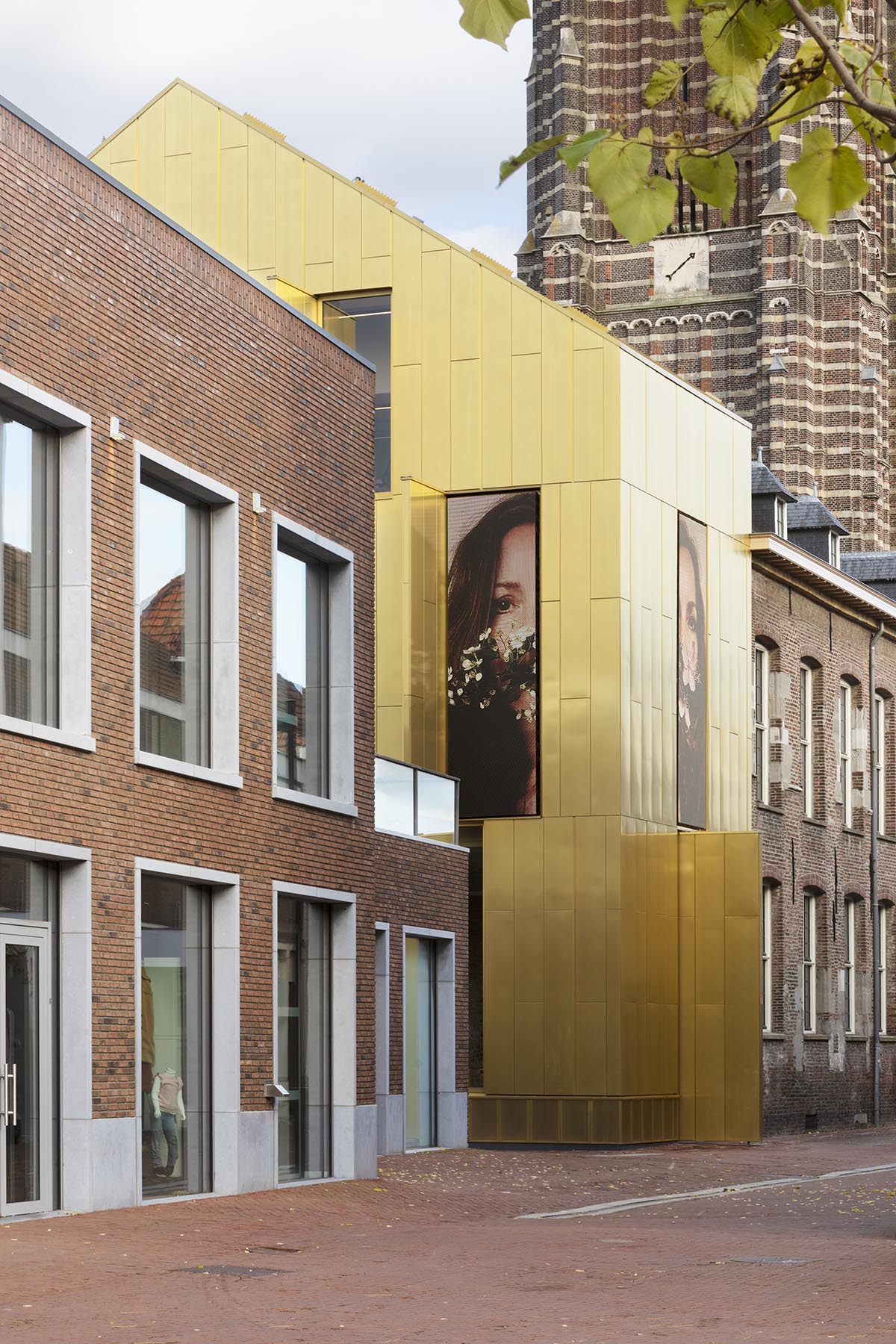
The majestic entrance on the Markt, with its pillars and exterior staircase, will be used for special events such as weddings and ceremonial gatherings, as well as film showings and musical and theatrical performances in the building.
The designer added contemporary elements to the main building with "a quasi-surgical operation", with the deepest respect for the building’s heritage. For instance, the designer installed a remarkably slim staircase in the existing stairwell and which projects from the wall like a minstrel’s gallery.
The attic floor will function for the museum’s permanent collections and educational activities, which can be accessed by these stairs.
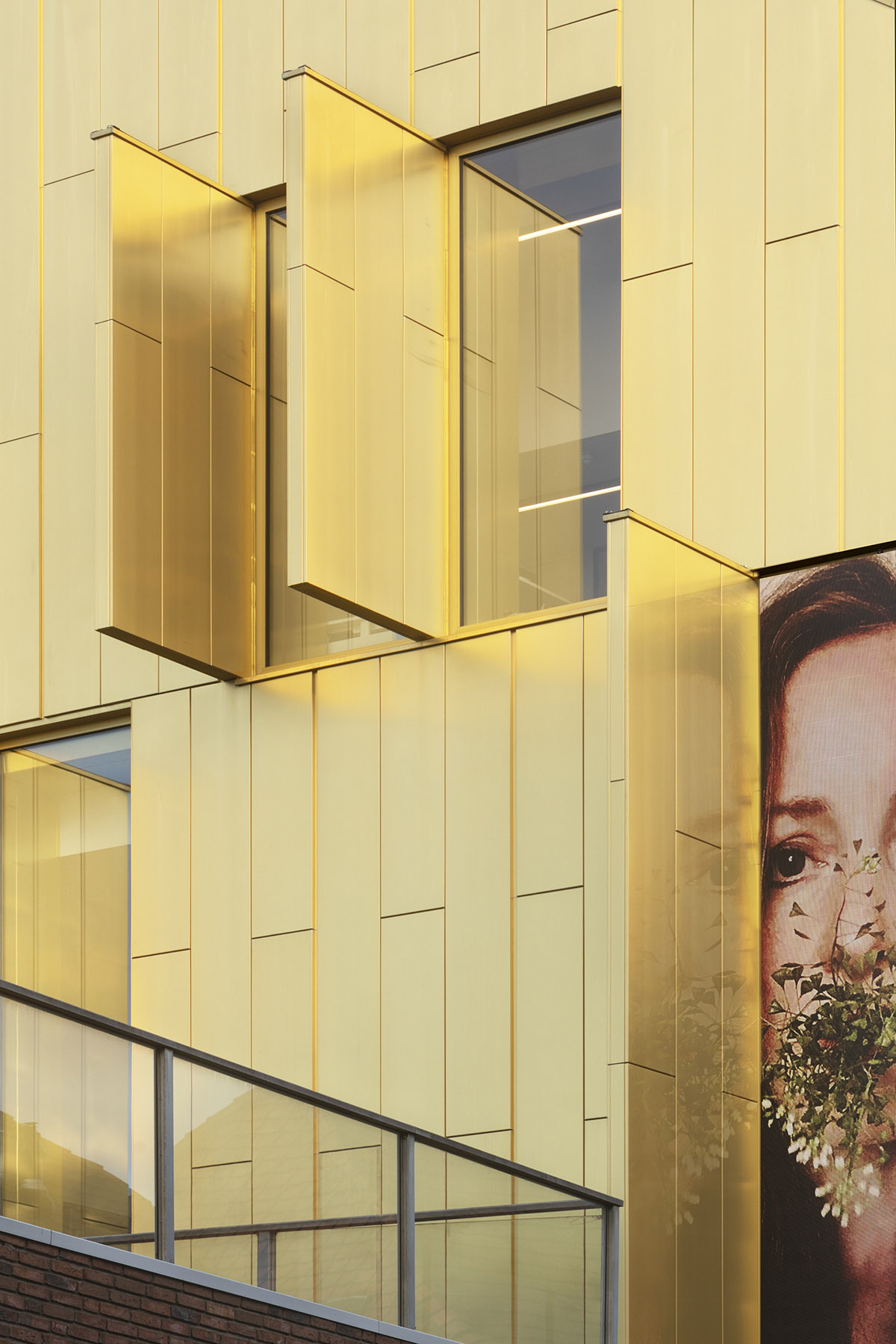
The new gold yellow extension contains an emergency staircase, a lift, sanitary facilities, offices, a meeting room, and a storage area. The designer removed the existing lift, the meter cupboards, and the sanitary facilities in the monumental building to enable these rooms to be restored to their original condition.
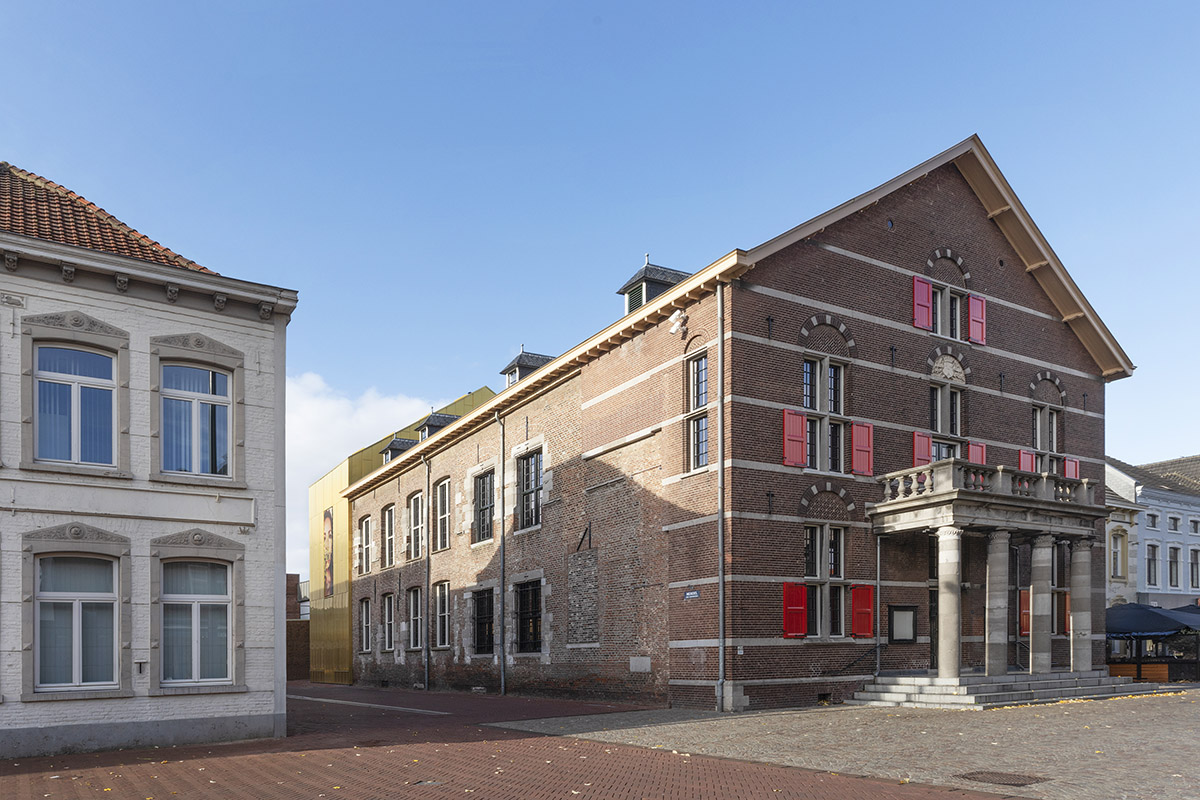
Unique showcases and furniture
Mentjens also designed the exhibition space to accommodate the new presentation setup of the permanent collection in the renovated and restored museum building.
In addition, Mentjens designed all the furniture, showcases, and suspension systems especially for Museum W. For this pieces, the designer used sustainable and recyclable materials as much as possible.
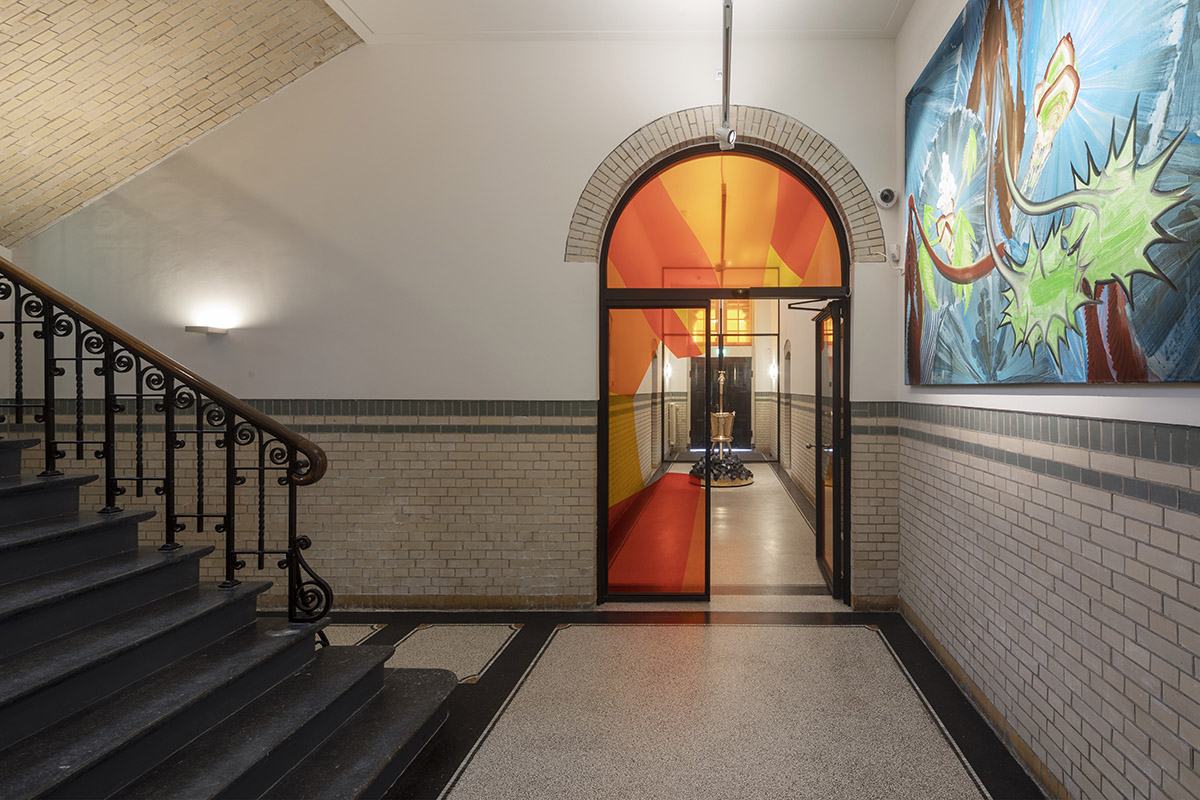
He designed an open presentation system for the new floor that was created in the attic with its distinctive arched rafters. Some rooms are also equipped with remarkable drawer units on top of which glass display cases have been placed.
Dozens of objects are displayed in the glass-covered drawers to complement the themes of the permanent collection.
On the first floor and in the attic floor, the building houses the permanent collection which is presented as an overarching concept in which eleven themes related to human life are portrayed.
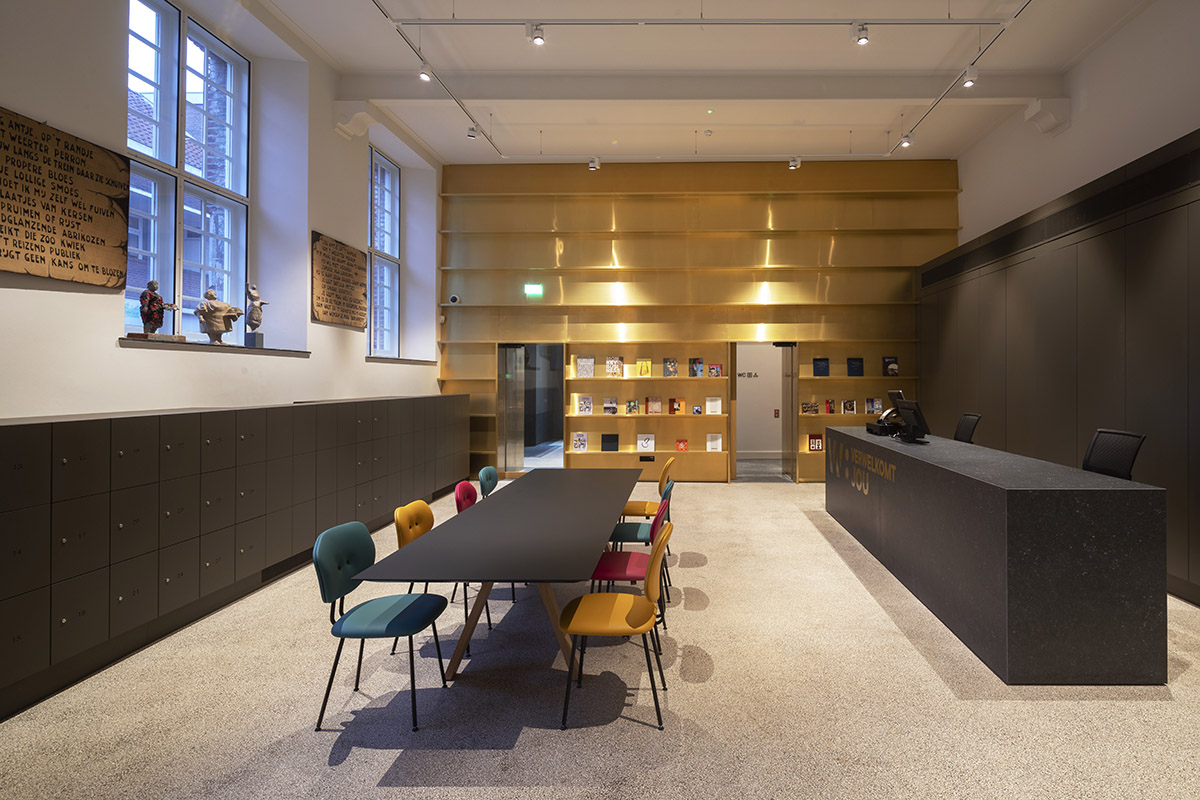
On the gallery, the theme of human body shines a spotlight on the naked body as well as on clothing and decorations in the form of jewellery and tattoos.
In the design of the spaces, Mentjens designed a different colour to each thematic area. The changing of colors allows visitors to wander through the ever-changing atmospheres of the various museum galleries in a way that is comparable to a walk through life itself.
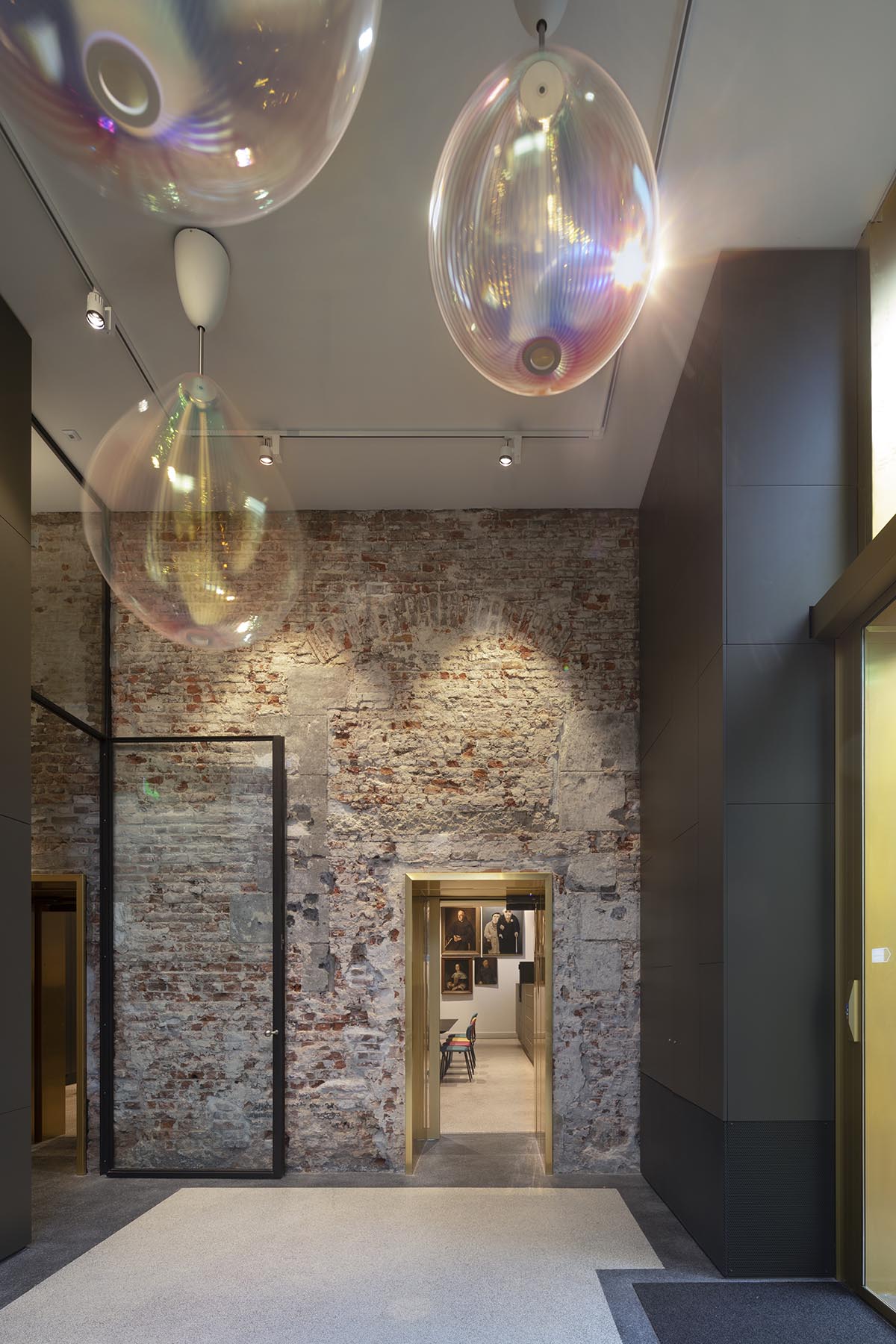
Temporary exhibitions of contemporary art are presented on the ground floor and in the Council Chamber on the first floor.
Through his powerful ingenuity in terms of design, Mentjens succeeded in striking a perfect balance between the historic and the contemporary in both the exterior and the interior of the museum.
This gives the heritage-listed building a historic yet modern face, and enable the collections of the past to recount the richly varied stories of the present.
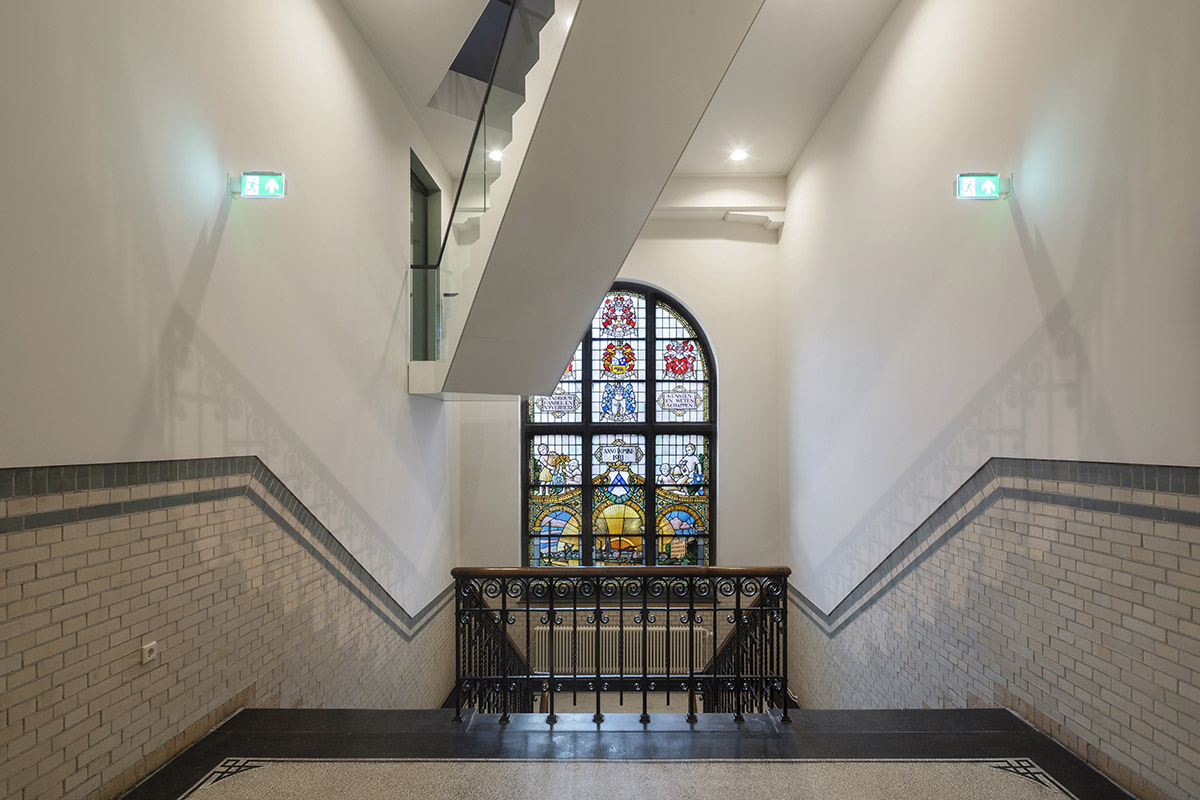
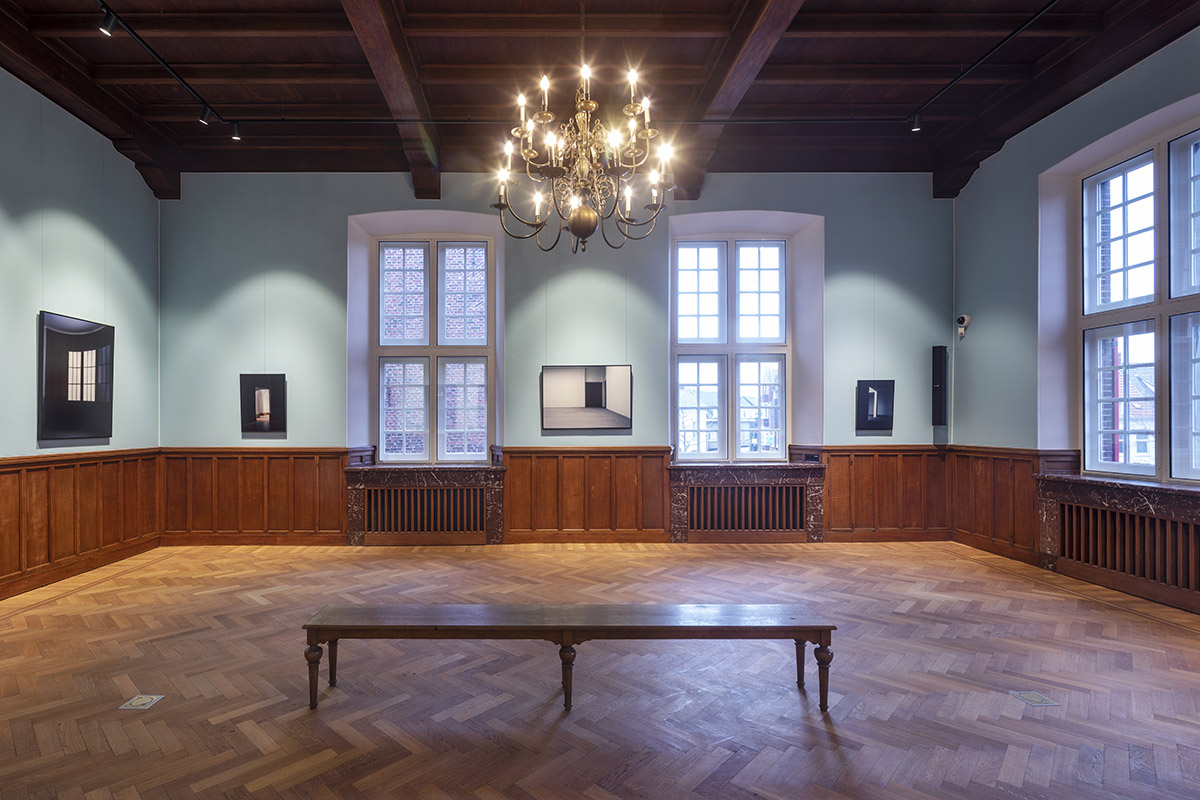
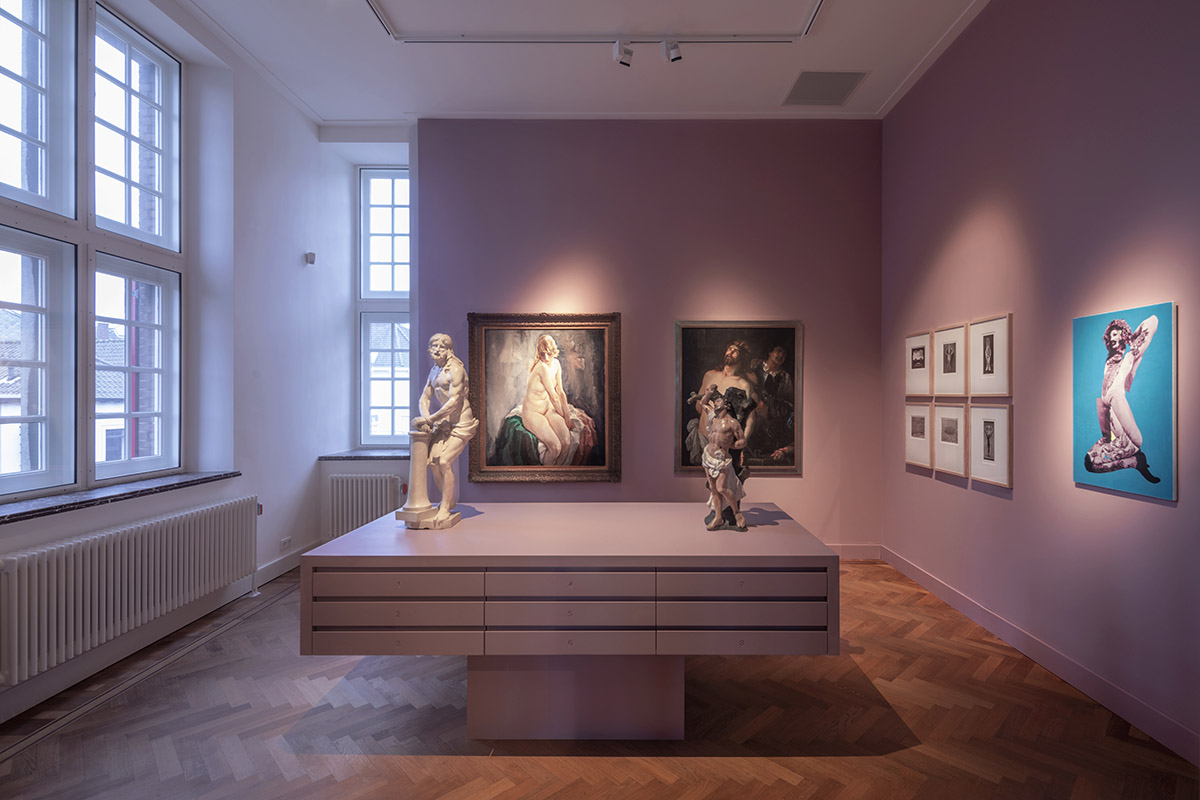
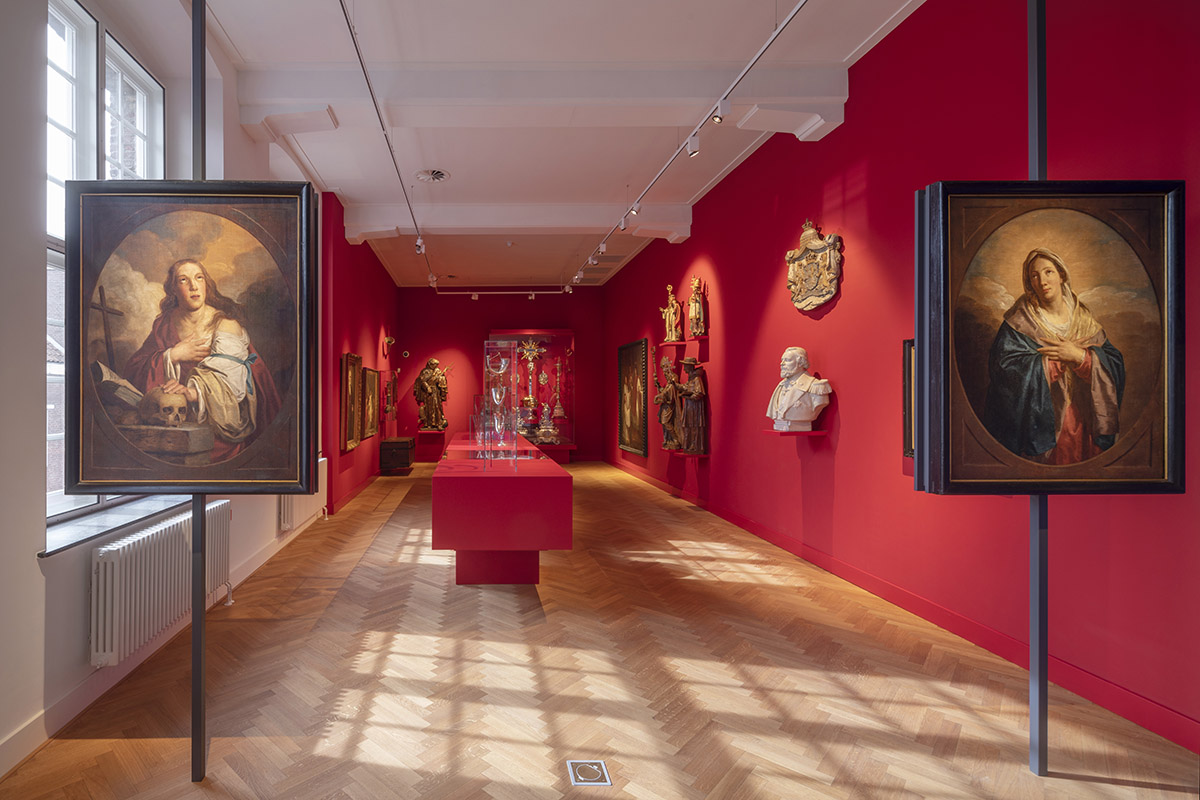
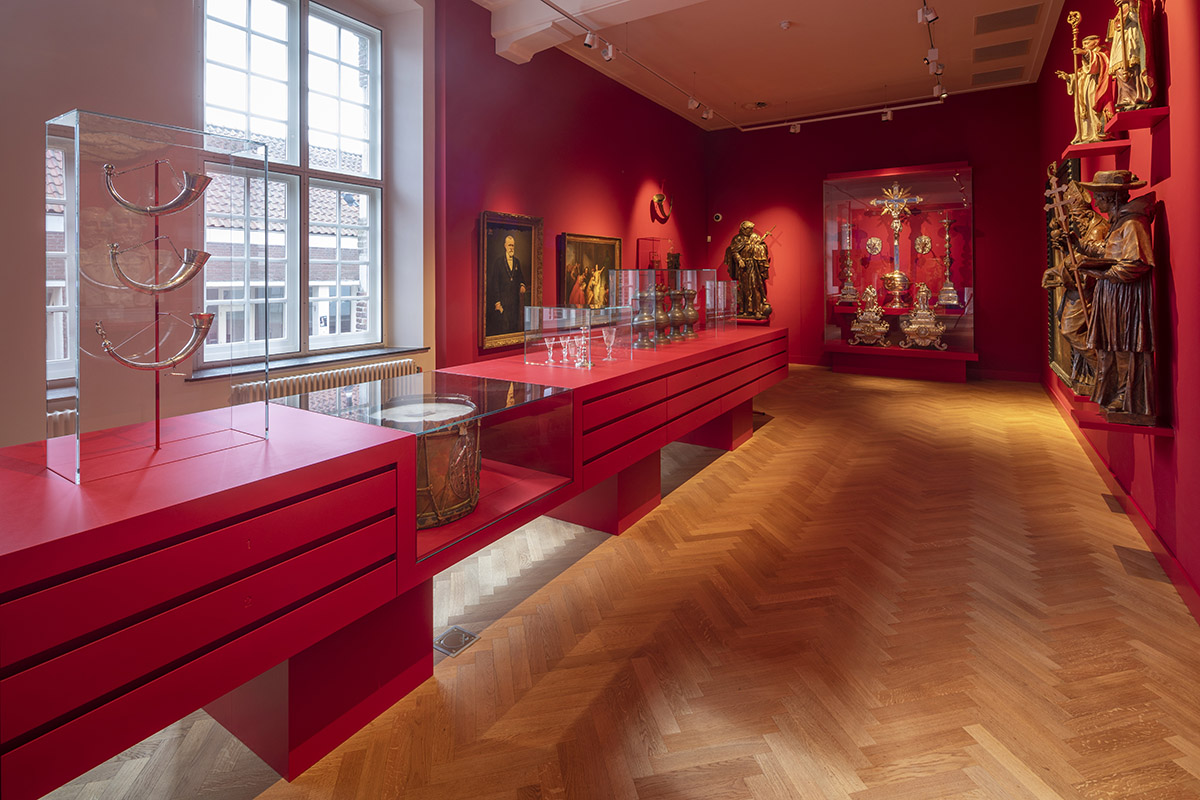
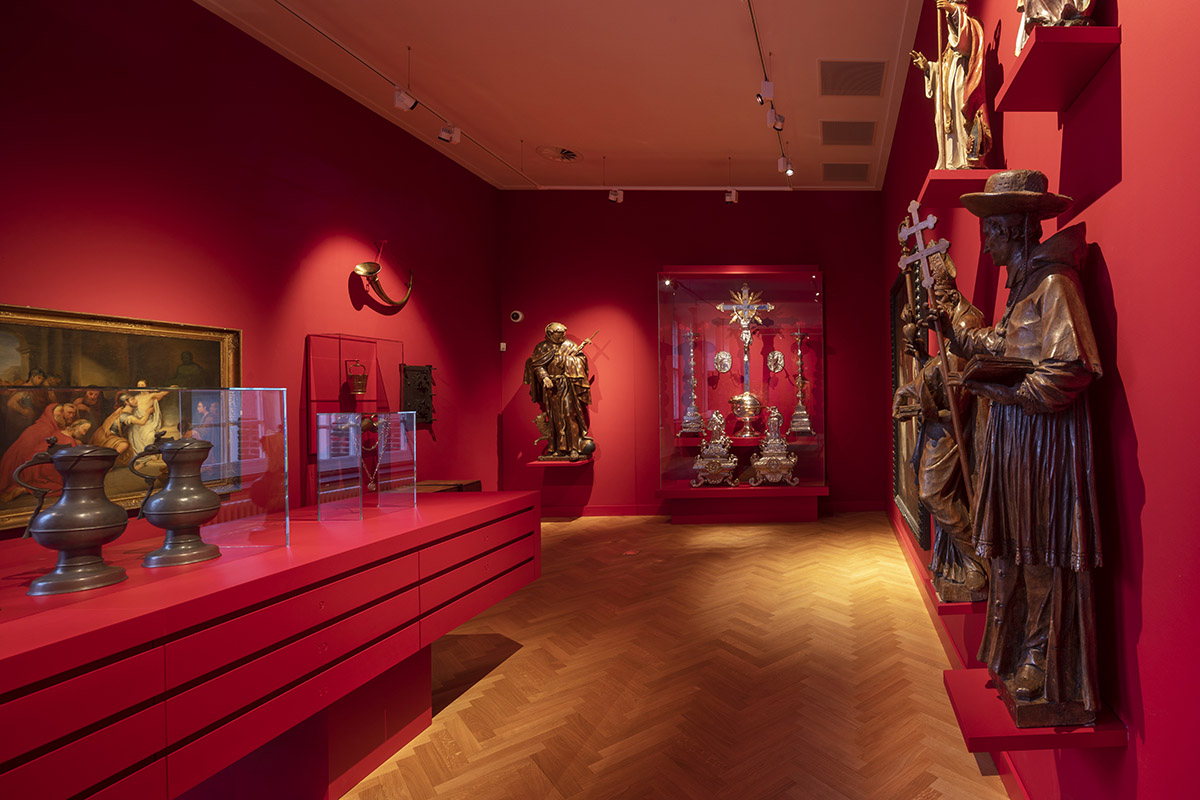
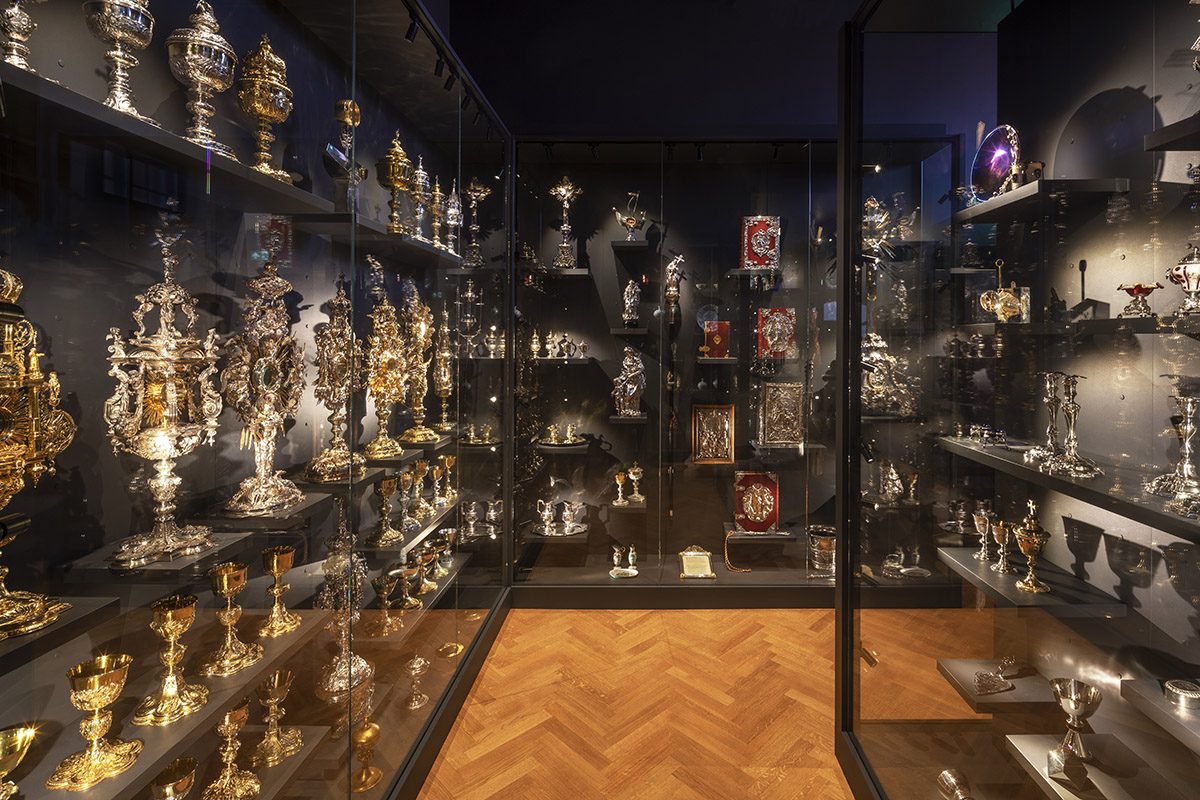
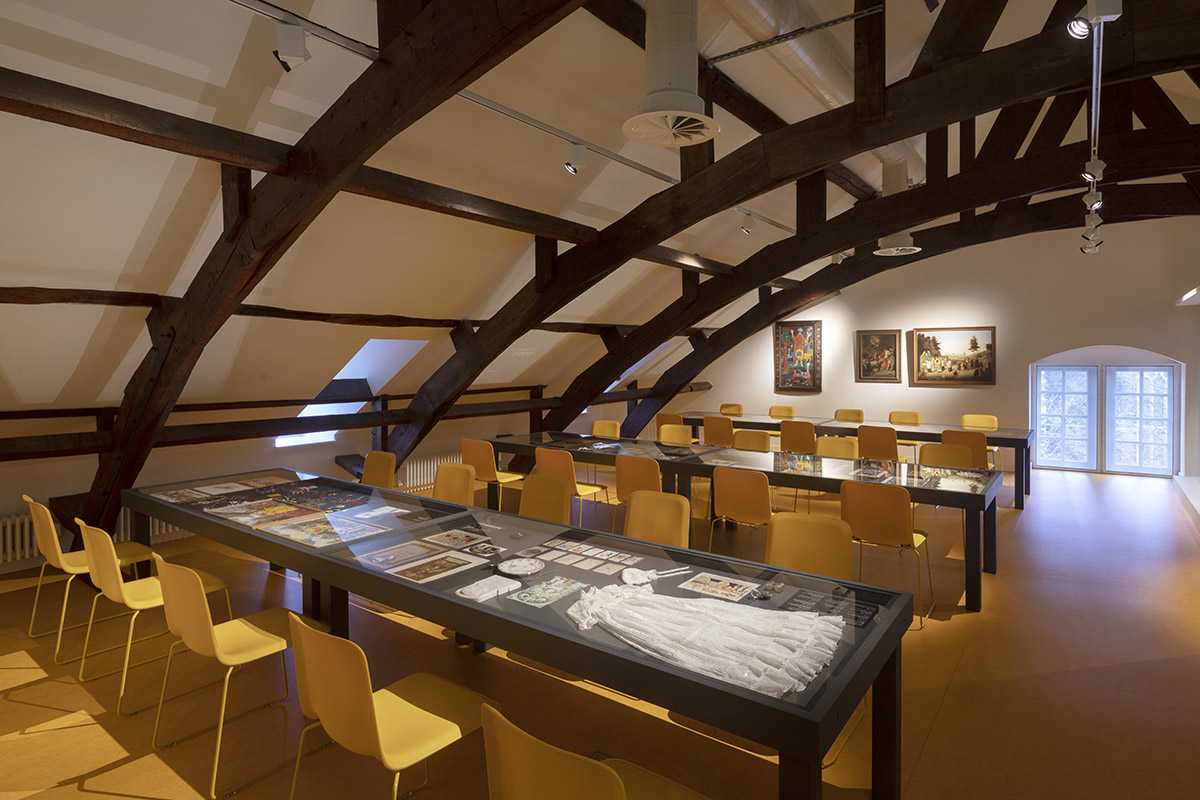
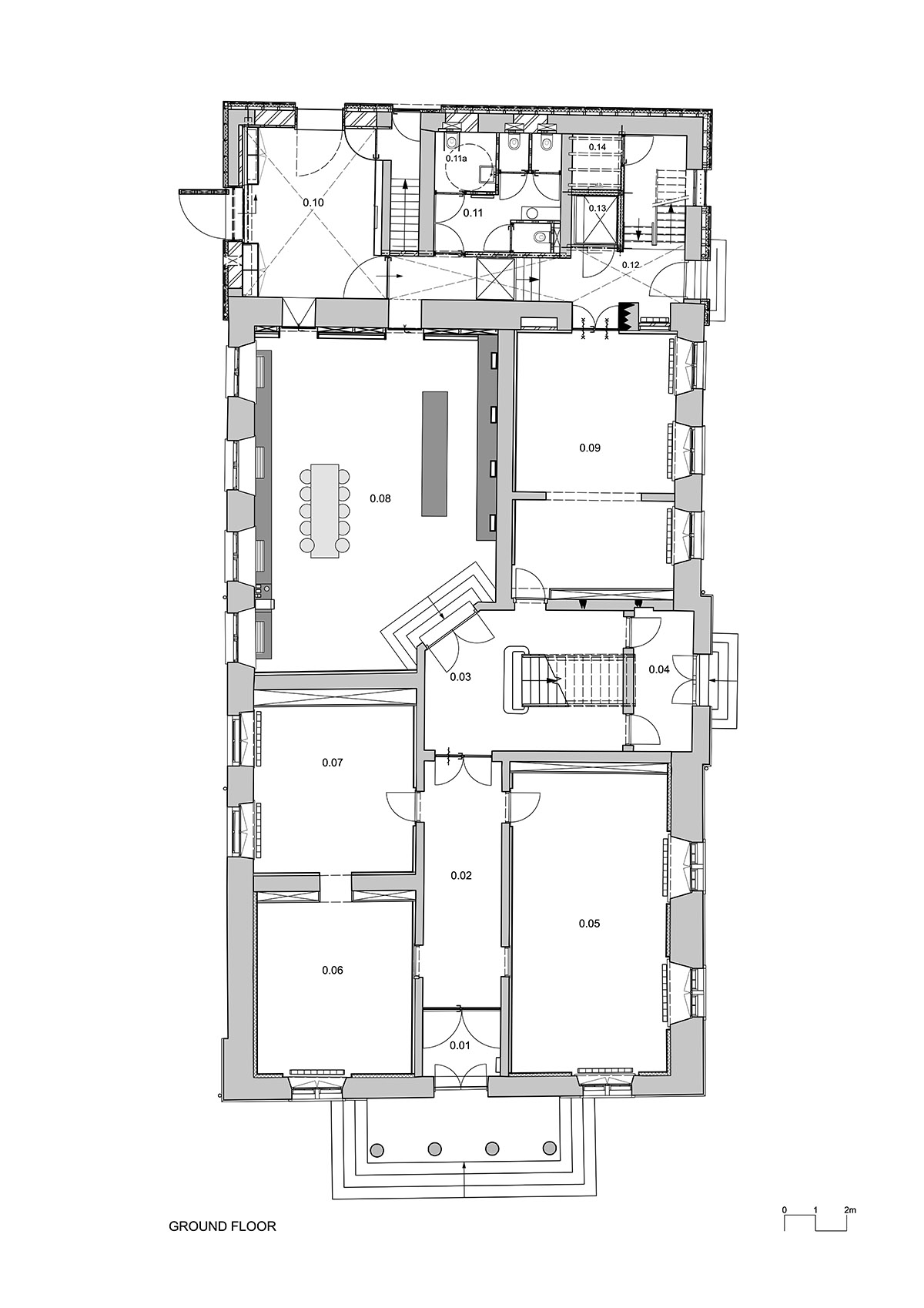
Ground floor plan
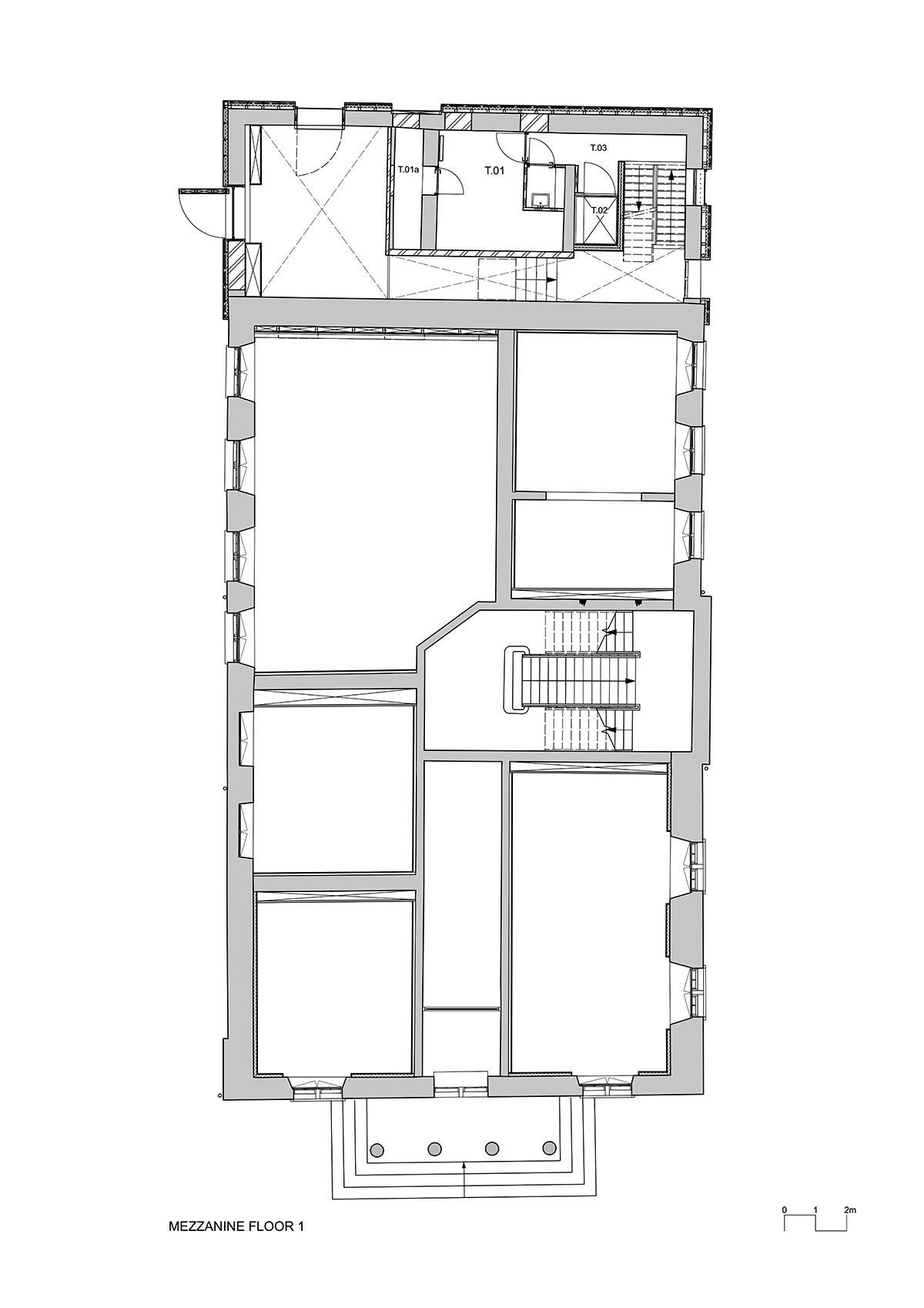
Mezzanine floor plan
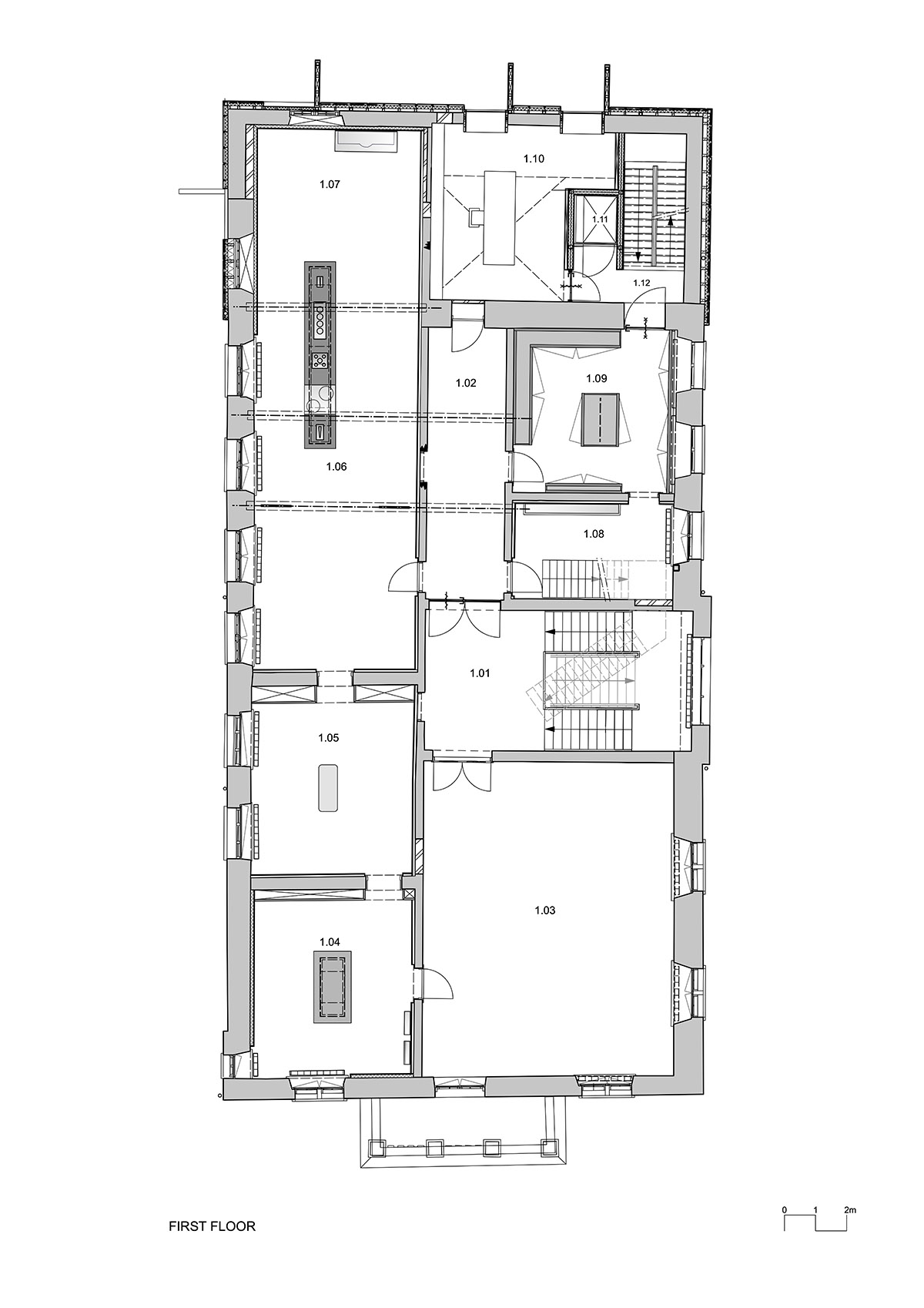
First floor plan

Second floor plan
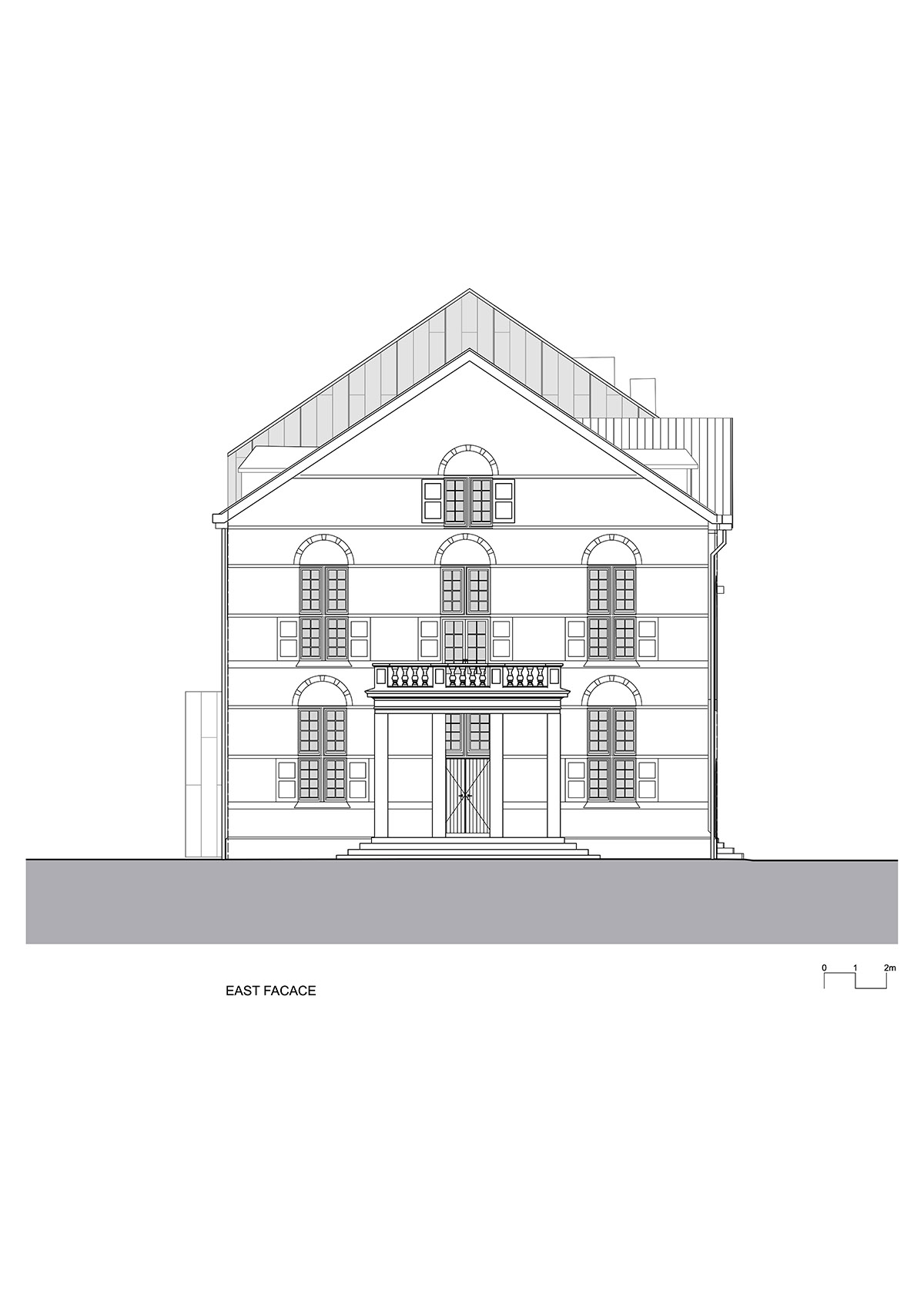
East façade
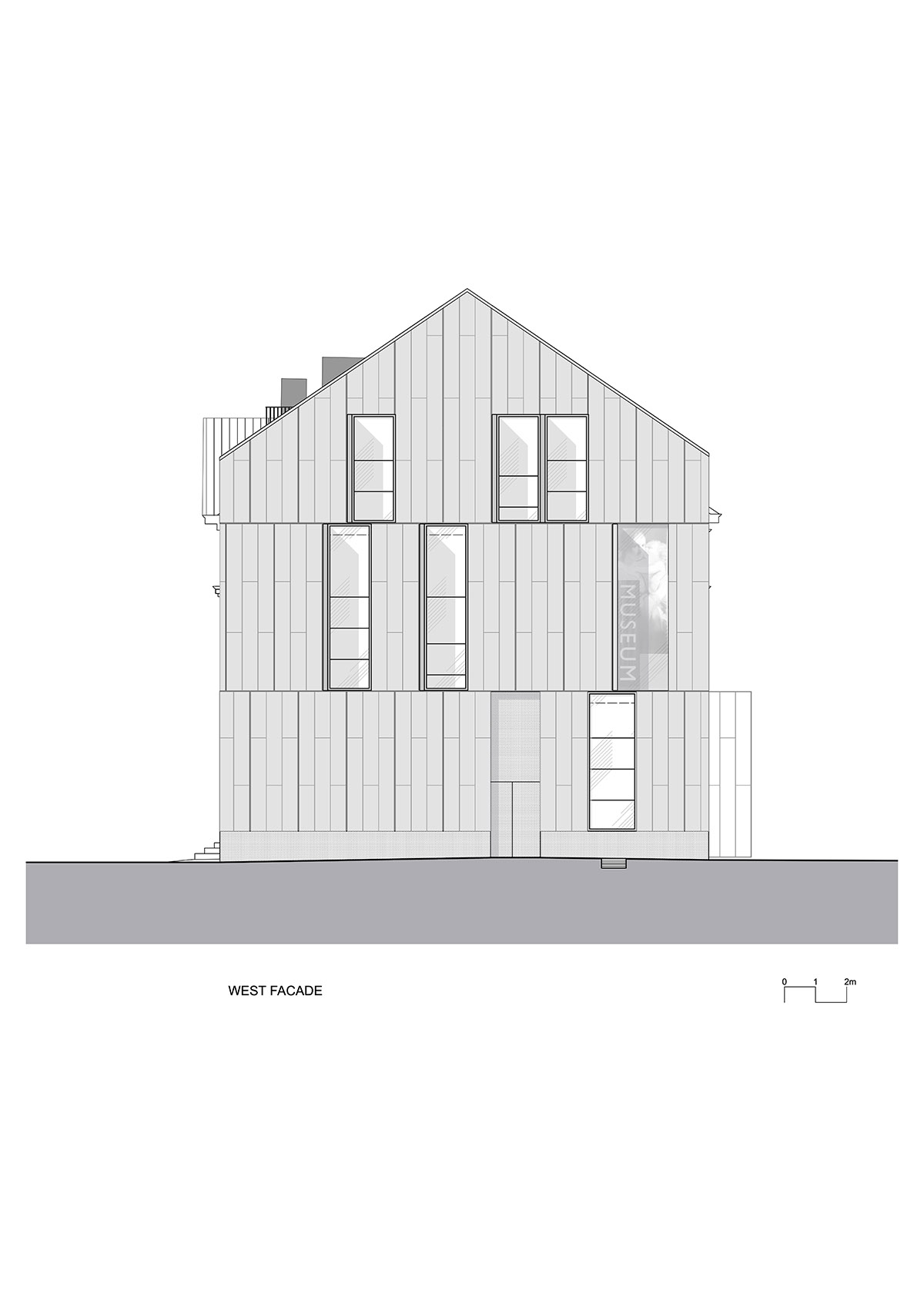
West façade
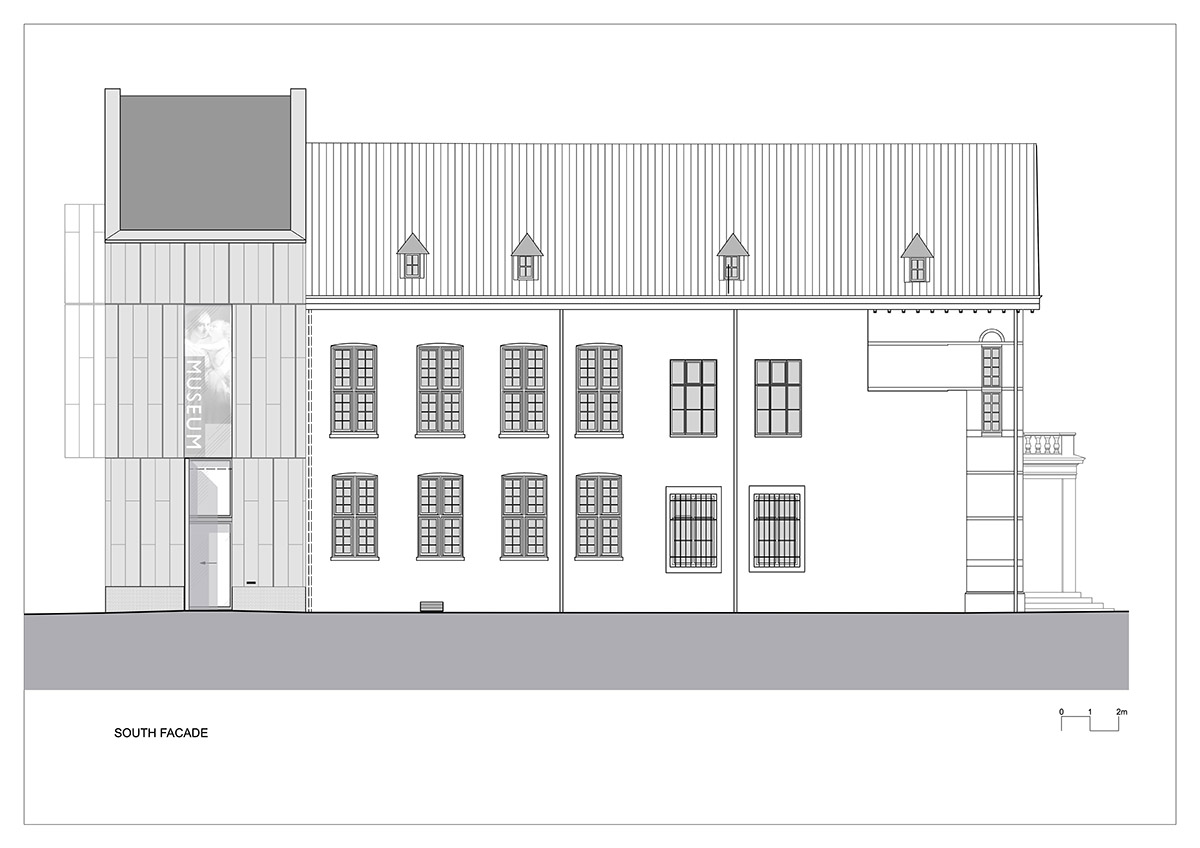
South façade
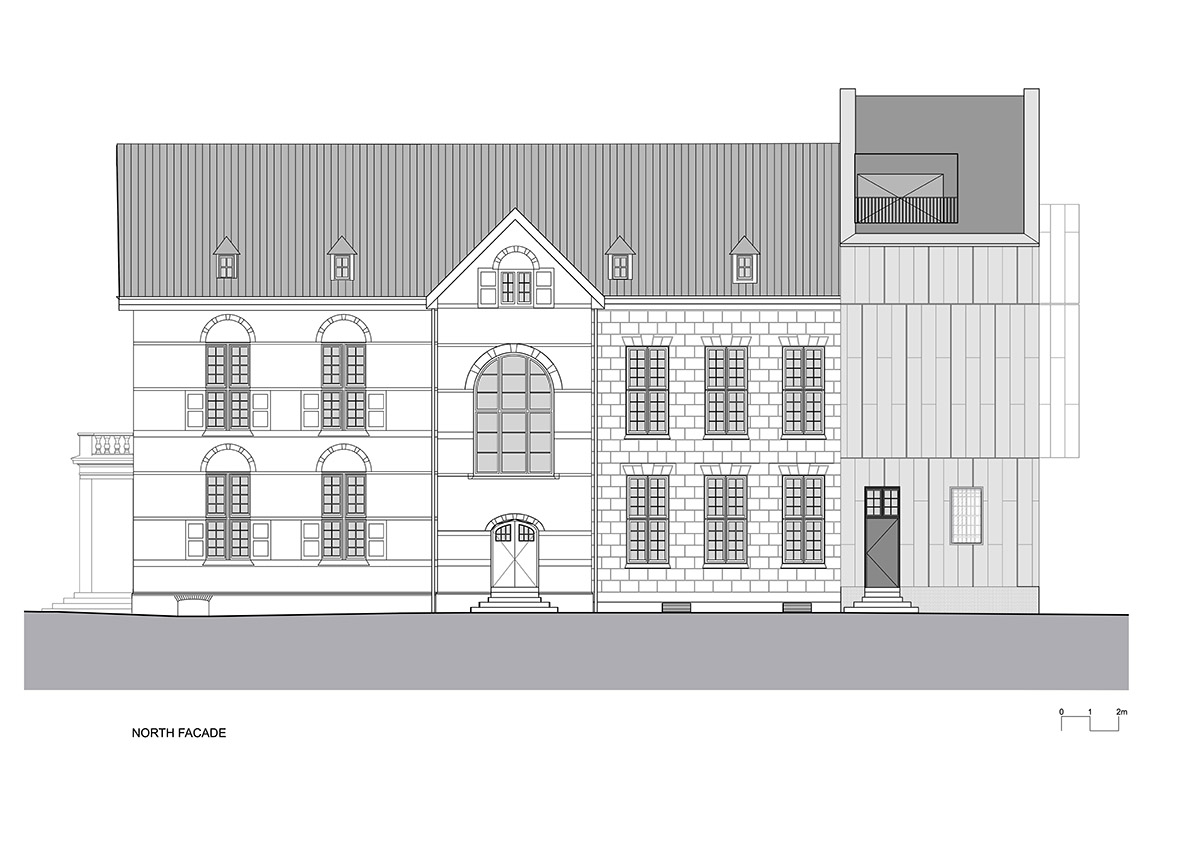
North façade
Project facts
Project name: Museum W
Architect: Maurice Mentjens
Project team: Marga Gilissen-Paulissen, Jeroen van de Kerkhof, Lesley Ruyters, Annet Hermans - Butink, Fabien Franzen, Sarah Philippaers, Frederic Leenarts, Yvo Lindeman
Location: Markt 7, 6001 EJ, Weert, The Netherlands
Project type: Museum
Process: Design 2017-2021 / Realization 2020-2022
Total built area: 1134 m2 floorspace
Commission: City Council Weert
Consultancy firms:
Constructions: Advies- en Ingenieurbureau Van de Laar - Monique Haenen
Installations: Huisman en van Muijen installatie adviseurs - Will van der Weijden
Lighting: Pro-Light
Acoustics: Peutz - Paul Steskens
Building physics: Peutz – Paul Steskens
Fire safety: Peutz – Paul Steskens
Monuments consultancy: Monumenten Advies Bureau
Interior design & exhibition furniture permanent collection: Maurice Mentjens
Graphic design: Studio Eikenhorst
Video on large screens façade: Emily Bates - Lost Spring. Lost Year.
Holons: Martens & Visser
All images © Arjen Schmitz
All drawings © Maurice Mentjens
> via Maurice Mentjens
